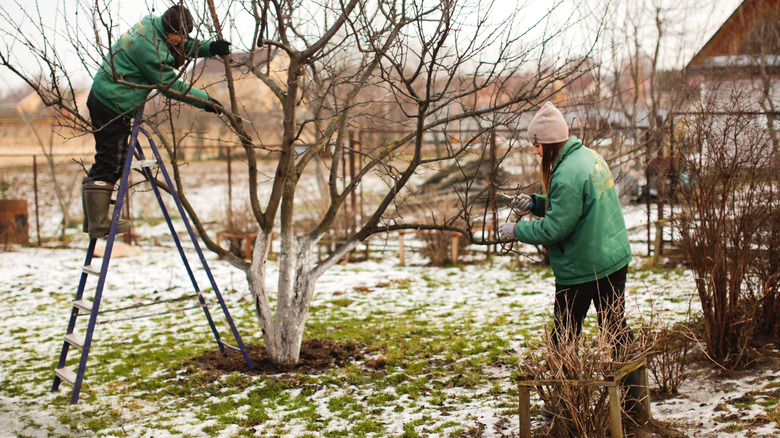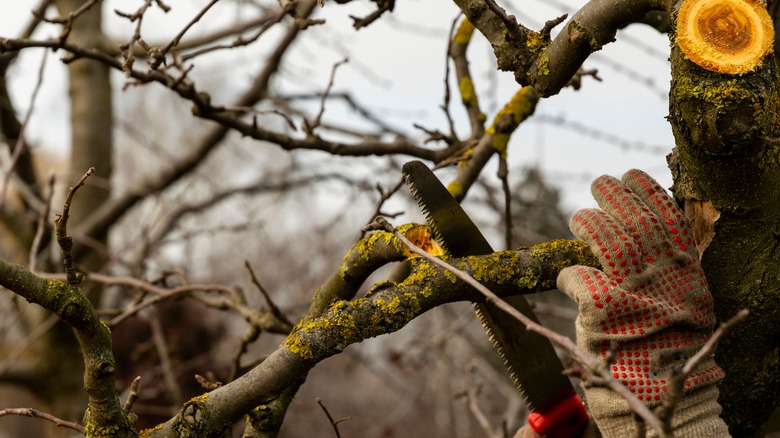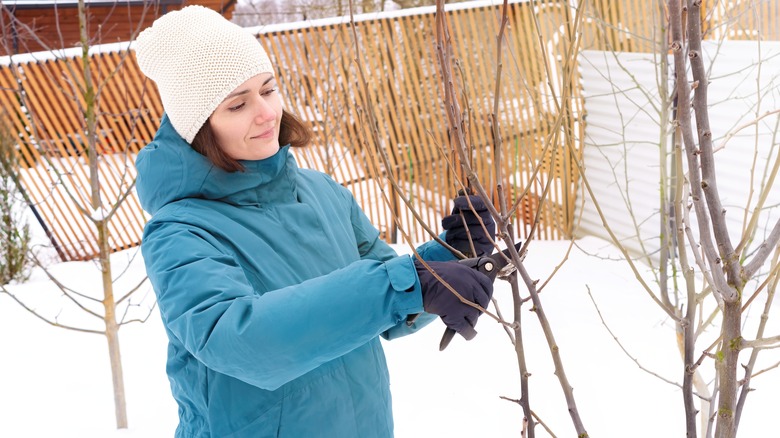Forgetting To Prune These Trees In The Winter Could Be A Big Mistake
Pruning trees aims to encourage new growth in the following season and allows for the controlled development of the tree. However, not all trees should be pruned at the same time of the year, and there's ample confusion about when to prune each. Trees such as oak, elm, and apple should be pruned in the winter months, because doing so helps to minimize fungal disease. Other tree varieties that do well with winter pruning include Hawthorne, beech, linden, maple, and mountain ash. Pruning trees helps to encourage healthy growth, minimizes damage from branches rubbing against each other, and can help to open up the canopy itself, which allows for better light and air movement through the tree, stimulating more blooms and leaves. However, numerous pruning mistakes can occur, including pruning the wrong trees at this time of the year.
Wintertime pruning, called dormant pruning, enables the removal of dead and damaged material, as well as excessive growth areas that could be striking your home or hanging over into the neighbor's yard. When you cut back on the growth at this time, the tree has more time to recover before the stress of springtime blooming.
Pruning your dormant trees in the winter prevents disease
Pruning these trees during the winter months offers numerous benefits, including minimizing the spread of some types of fungal disease as well as damage from other pests. Those organisms are dormant during the colder months, which means the wounds created on the tree are not at risk of pathogens causing damage to them. For example, if you were to prune a tree with Dutch elm disease during the spring and summer while the disease is at its most ferocious level, it's easier for that disease to spread to other trees and infect more of your landscaping and lawn.
Diseases like Dutch elm, fire blight, and oak will take a cue from the trees during the fall month and become dormant. That means the bacteria and fungi themselves are less likely to be active enough to spread. Even if spores from mold and mildew are present on the branches you are pruning away, those spores are not active and, therefore, not being transmitted from one plant to the next while you cut them back and remove them.
If there are situations where your trees are struggling with severe disease, your arborist may recommend pruning away the damaged areas no matter what time of the year it is. That's a wise move if it gives the tree the best advantage of recovery, and waiting until winter just isn't an option. Still, the risk of spread is high at any other time.
Other advantages of wintertime tree pruning
You'll also find that it's far easier to prune trees during the winter months because there's less foliage in the way. The ground is also frozen, which means if you need to bring in the big machines, they are likely to have a solid surface to move across. More so, pruning now also allows you to take advantage of tree-trimming companies that may have lower prices during the offseason since they are not as busy.
Most importantly, some trees simply thrive when pruned during the winter months. It allows for less stress on the tree (and that means that your tree is likely to flourish in the spring months). Also note that it also prevents winter damage, such as from the build-up of ice and snow on damaged and dying branches, from impacting the health of the tree. There are some trees best left to the spring months after the initial flowering, including birch, butternut, and maples. If you're unsure how to prune a tree, it's best to leave this task up to the pros for safety.


